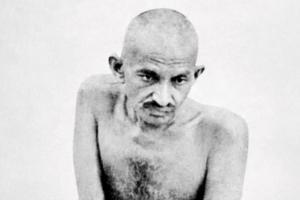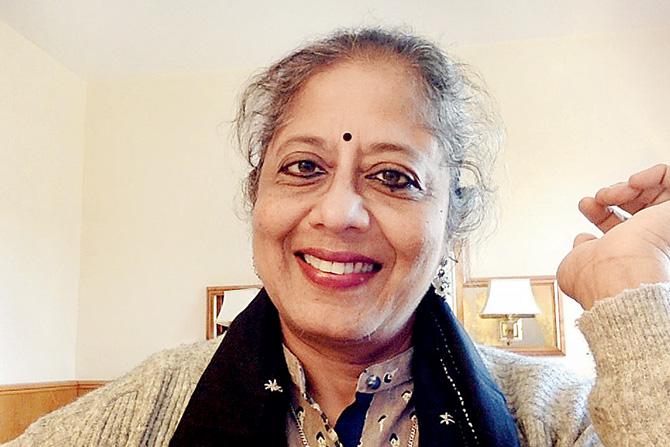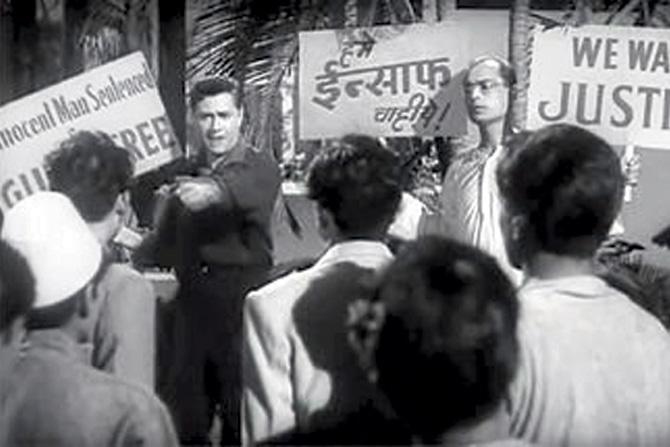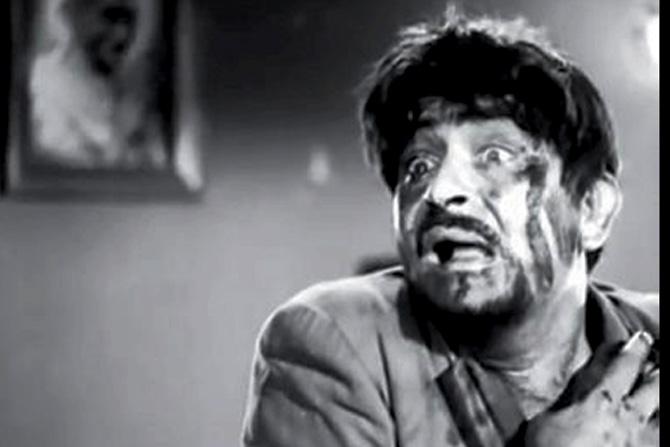On his 150th birth anniversary, authors of two new books on the Mahatma discuss how cinema and music of the time, drew inspiration from him

Mahatma Gandhi. Pic/ Getty Images
As historian, Lakshmi Subramanian has always been curious about the peculiar—researching odd-ball stories, where previously unrelated facts come together to create a whole. Her new book, Singing Gandhi's India: Music and Sonic Nationalism (Roli Books), is an exercise in that direction. Yet, when she was first approached to write a book on Mahatma Gandhi and music, Subramanian recalls her response as being a "resounding no". "My initial reluctance was partly informed by a sense that Gandhi would have had very little and substantive to say about music per se; and about the complex public history that music threw up in the 20th century. Equally, I was convinced that Gandhi would have unproblematically endorsed the bhajan as it had emerged as a form of marking an exclusive Hindu identity," she shares, in an email interview.
London-based journalist Sanjay Suri's tryst with the Mahatma in his new book, A Gandhian Affair: India's Curious Portrayal of Love in Cinema (HarperCollins India), was more organic. "I did not set out to research Gandhi," he admits. The book, he says, grew out of watching hundreds of Hindi films over many years. "Gandhi just kept popping out of them."
ADVERTISEMENT
Where biographies and academic texts have been forever been engaged with examining Gandhi, the leader, and his role in pre-independent India, close on the heels of his 150th birth anniversary, Subramanian and Suri have explored how he culturally influenced the nation.

Lakshmi Subramanian
A song for the community
It was only after Sumbramanian, a professor at the Humanities and Social Sciences faculty of BITS Pilani in Goa, decided to engage with Gandhi's relationship with music that she realised "that not only had he a lot to say about sound and its use in politics, he was curious and inquisitive and inconsistent making his writings a treasure trove for a student of history".
In the book, she writes of how Gandhi was moved, when he first heard 'Vande Mataram' [written by Bankim Chandra Chatterjee] in 1915 in Madras. "You have sung that beautiful national song, on hearing which all of us sprang to our feet. The poet has lavished all the adjectives we could possibly do to describe Mother India," he told the assembly.

Sanjay Suri
Gandhi, she says, saw music as one of the many tools to infuse a feeling of community. "I think Christian singing made a deep impact on Gandhi and the idea of a congregation had definite appeal. This was evident in his experiences in England, and while in South Africa, congregational singing became a form of political communication. The idea was to feel a oneness that went beyond narrow self-interest and work around a moral basis for political action. Prayer, music and spinning were all tools of individual self-regeneration and community building," says Subramanian, who read his collected works in great detail to contextualise her research. Her work also helped quell any misgivings about Gandhi propagating religious music. "At no point did he equate the Hindu religion with music of a particular kind; nor did he espouse the cause of devotional singing in public as an essential feature of the Hindu religion."
Subramanian, however, admits that Gandhi, unlike his contemporary Rabindranath Tagore whose contribution to music nationalism was immense, was not a "rasika". "He did not appreciate the technicalities or even profoundness of the classical traditions in India, but as an inquisitive person responding to debates and public discussions was not unaware of the emerging discourse on music reform and revival. He responded to the emotional dimensions of music and certainly insisted on a trained teacher for his ashram experiments," she says, adding, "He listened to music with great attention and was convinced that it had the power to move millions and to still them into contemplation."

The hero (Dev Anand) of Kala Pani (1958) finally declares satyagraha as his way of securing justice
A moral code for cinema
Suri, on the other hand, discusses how Gandhi's values and virtues were so deeply enmeshed in the Indian psyche that the heroes of Hindi cinema—at least till late into the 1970s—sub-consciously replicated his virtuosity. They did it in two ways, he says. "One, and always, at pivotal points through the scripted story path of the hero. These are the decisive moments when choices have to be made. Those turn out always to be moral choices of a kind—rejection of wealth and a turning away from sex. It's these moral values that turn the plot, and which then give this phase of cinema that feeling of sameness. The hero is always confronted with those temptations, and it is the rejection of both that establishes him as heroic. Those are the very two temptations that Gandhi, the man most sought to overcome," says Suri, who has previously authored, 1984: The Anti-Sikh Violence and After.

Shammi Kapoor, the hero of China Town (1962) is led away from romancing to the path of seeking justice under the watchful eyes of Gandhi. Pic courtesy/A Gandhian Affair by Sanjay Suri, HarperCollins India
He adds, "Secondly, countless invocations to Gandhi himself surface—images of Gandhi show up in one scene or another particularly when the moment of truth comes. These images didn't just happen, in this carefully crafted business of set by set, scene by scene."
According to Suri, Gandhi was far too complex a figure and his experiments in life were both controversial and fascinating. But cinema didn't grapple with any of that. "The Gandhi brought into this cinema is a man identified by a few broad strokes: the one who turned away in his personal life from wealth and sex, the vegetarian who believed in non-violence and who found strength enough through that bare simplicity to take on the greatest power on earth and to dislodge it."

The innocent man, played by Raj Kapoor, on the run in Jaagte Raho (1956), finds refuge at last under the blessings of Gandhi
The Hindi film, he feels, that first broke out from this Gandhian narrative was BR Chopra's Ek Hi Raasta (1956). "The hero [Sunil Dutt] is a junior manager killed by a corrupt employee. So she [his wife, played by Meena Kumari] marries his rich boss [Ashok Kumar], and repeats the love song she had sung with the first hero on his bicycle with the second hero in his long American convertible, the kind that ran only in studios. Through a look at the top 10 films of every year from 1948 to 1959, this was the only striking exception to the dominant pattern," says Suri, adding, "We would have to wait for Manmohan Singh to come along for the hero to come into wealth without guilt." While the fascination with Gandhi seemed to have petered out by the late 1980s, Gandhi is once again resurrected in Lage Raho Munnabhai (2006), where he literally becomes the alter ego of the protagonist, Sanjay Dutt, getting him to propagate the now famous, Gandhigiri.
Did Gandhi ever reciprocate this adulation bestowed to him by cinema? "From what is known, Gandhi seemed to have thought very little of it. But in the invocations to him that followed, in the resurfacing portraits and dialogues, in the binding spell his ideals would have on the hero, Gandhi found a career in Bollywood far from his own world."
Catch up on all the latest Mumbai news, crime news, current affairs, and also a complete guide on Mumbai from food to things to do and events across the city here. Also download the new mid-day Android and iOS apps to get latest updates
 Subscribe today by clicking the link and stay updated with the latest news!" Click here!
Subscribe today by clicking the link and stay updated with the latest news!" Click here!







